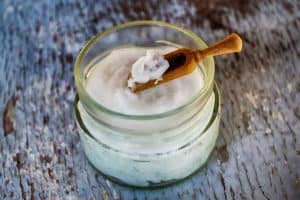Coconut oil is one of the latest and greatest superfoods.
Coconut oil has been shown to help burn fat, reduce hunger, increase good cholesterol, and destroy harmful microorganisms in the body. All of these factors are beneficial for our skin too!
On top of that, a lot of people say that eating or applying coconut oil to their skin has helped with their acne, eczema, and other autoimmune conditions.
On the other hand, a lot of people claim that coconut oil can easily clog your pores and make acne worse.
Who should you believe?
In this article, we’re going to take a look at the science behind coconut oil and acne, and break down whether or not you should be using coconut oil for clear skin. We’ll cover:
- Should you apply coconut oil to your skin (hint: maybe)?
- Should you eat coconut oil for clear skin (hint: yes!)?
- The best coconut oil to use for acne-prone skin
3 Reasons Why Coconut Oil is Great for Acne-Prone Skin
Coconut oil has a ton of beneficial effects for your skin. Unfortunately, there are also a few drawbacks to using coconut oil that might make your acne worse if you apply it directly to the skin. Let’s take a look.
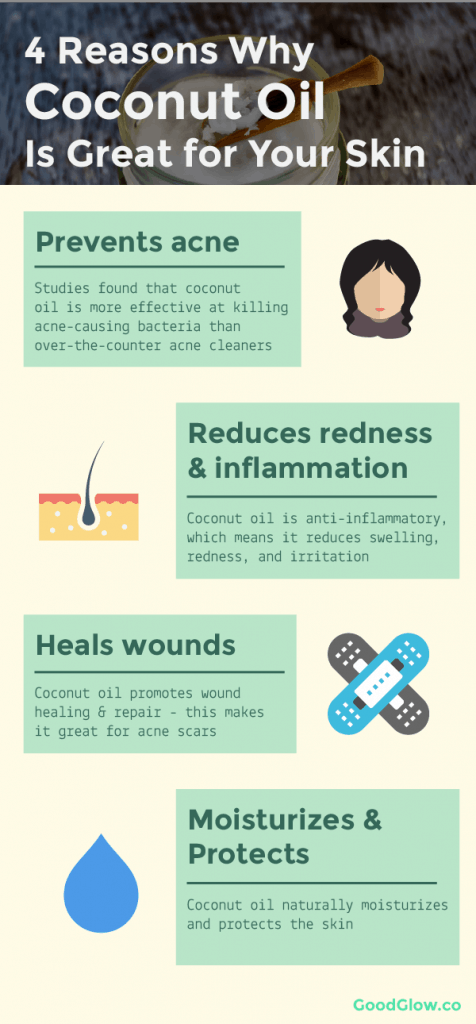
#1. Coconut oil kills acne bacteria better than benzoyl peroxide
Yup, you heard that right – coconut oil contains lauric acid, a fatty acid that has a very strong antibacterial effect, especially when it comes to fighting acne bacteria.
In fact, one study found that lauric acid was more effective than benzoyl peroxide (the most popular store-bought acne treatment) at killing acne bacteria.
Best of all, coconut oil comes without the nasty side-effects of harsh acne cleansers.
Many commercial cleansers, including just about any acne product you’d pick up at a drug store or buy online, use benzoyl peroxide as the main active ingredient.
While benzoyl peroxide is great at killing acne-causing bacteria, it also kills beneficial bacteria on the skin and can dry out the natural, healthy oils the skin needs to protect itself. Benzoyl peroxide and most other topical acne treatments don’t treat the root causes of acne, they only treat the symptoms.
That’s why a lot of people experience temporary success with commercial cleaners, only to find their acne coming back stronger than ever a few weeks later.
#2. Coconut oil makes the skin less red and inflamed
Inflammation is one of your immune system’s natural response to outside threats. Inflammation is oftentimes a good thing – it helps us heal faster, prevent infections from taking hold, and fight off harmful threats.
Inflammation becomes a bad thing when it’s chronic. Chronic inflammation occurs when an overactive immune system fires off an inflammatory response to just about anything, include acne infections.
The thing is, acne infections aren’t all that dangerous to the body, but because of chronic inflammation, your body takes this harmless acne infection and turns it into a bright, red, protruding pimple.
Sound familiar?
That’s because most people who struggle with acne also struggle with chronic inflammation, which can be caused by eating too many grains, unhealthy fats, and artificial foods.
Luckily, the same study that found coconut oil fights acne bacteria better than benzoyl peroxide also found that coconut oil is anti-inflammatory.
This means that coconut oil, when applied topically, can decrease swelling and redness of the skin.
Coconut oil is also anti-inflammatory when eaten, but we’ll get to that in a second.
#3. Coconut oil is a great moisturizer and can heal the skin
Coconut oil is one of the only topical treatments for acne that can both prevent acne bacteria from creating infections and moisturize the skin.
Most acne products strip the skin of essential oils and disrupt the skin microbiome – yup, just like your gut, your skin has a microbiome full of helpful and healthy bacteria too.
While you might be killing plenty of bad bacteria with that acne cleanser you’re using every morning, you’re also killing a lot of good, healthy bacteria your skin needs to thrive.
Luckily, coconut oil has been shown to have a moisturizing effect on the skin.
Another study found that coconut oil promotes skin wound healing. This is another big win if you struggle with acne scars or are looking to generally improve the health of your skin.
A Reason you shouldn’t put coconut oil on your skin for acne
Despite all these benefits, I would still proceed with caution if you plan to use coconut oil topically.
Why?
Because coconut oil is also fairly comedogenic, which means it can actually block your pores.
When a pore becomes blocked from the outside air, it becomes a lot easier for acne bacteria to swarm the area and infect the pore. Then, inflammation and swelling can take hold, and you’re left with a pimple, blackhead, or whitehead.
This doesn’t mean that you shouldn’t experiment with coconut oil. I’ve personally seen great moisturizing results with very few negative side effects. Other people will, unfortunately, break out. You really need to listen to your body and adjust to what it’s telling you with coconut oil
Everyone’s skin will react differently, and for some coconut oil really may be an essential topical treatment for getting rid of acne.
If you’re looking for a non-comedogenic moisturizer, I would highly recommend an organic, cold-pressed raw aloe vera.
Aloe vera has a lot of the same benefits of coconut oil without the potential to clog pores:
- Anti-inflammatory
- Promotes wound healing
- Can moisturize the skin
I personally use aloe vera as a moisturizer in the winter and find it to be a great addition or alternative to coconut oil.
Should you eat coconut oil for clear skin?
This section of the article can be summed up into one word – yes!
It might sound weird that eating coconut oil can help acne, but remember – acne is mainly caused by our diet.
Every year, we get more and more evidence that what you eat, along with other lifestyle factors, like stress, sleep, and exercise, are what’s really behind acne.
I’m not going to go into depth here on the link between diet and acne, but you can see all my skin science articles here.
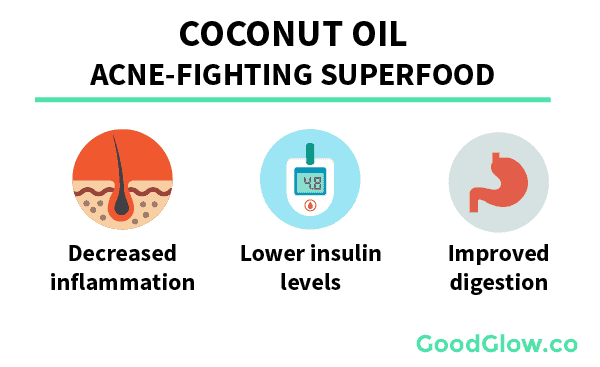
The reasons to eat coconut oil for clear skin are pretty convincing:
- Coconut oil can improve gut health
- It lowers your body’s insulin response (insulin the #1 hormone that causes acne)
- Increases the amount of nutrients you absorb
- Fights inflammation and act as an antioxidant
Let’s take a look at how these factors improve your skin’s health.
Coconut oil can improve gut health
Coconut oil is antibacterial, antimicrobial, and antifungal, which means that in addition to neutralizing acne-causing bacteria on the skin, it can also eliminate acne-causing bacteria in the gut.
Coconut oil has been shown to suppress H. pylori, Candida albicans, and Giardia, all harmful bacteria and fungi that can cause acne.
If you’re struggling with dandruff on top of acne, fungal infections or bacterial overgrowth in the gut could be the cause of both.
The MTC fatty acids found in coconut oil may also increase the strength of the intestinal wall and fight bad-bacteria in the intestine.
This makes coconut oil a great choice if you’re struggling with leaky gut syndrome or chronic inflammation.
A lot of people with acne have a “leaky gut”. This is where undigested food actually travels through the intestine and into the bloodstream. When this happens, the immune system fires off an inflammatory response, which can lead to acne-causing chronic inflammation.
It also means that coconut oil can help fight small intestinal bacterial overgrowth or SIBO. If you have dandruff and acne around your nose, lips, and eyebrows, SIBO could be the real problem behind your acne and coconut oil, along with other natural antibacterials like oil of oregano or berberine, could be a huge help.
Coconut oil makes your meals more nutritious
Believe it or not, you may not be absorbing most of the vitamins you eat.
There are two main types of vitamins:
- Water-soluble vitamins – Vitamin B1, B2, B5, B6, B12, Vitamin C
- Fat-soluble vitamins – A, D, K, and E
Our body can easily absorb water-soluble vitamins, but it has a much harder time absorbing fat-soluble vitamins.
This is unfortunate news because all the fat-soluble vitamins are crucial for clear skin, especially vitamin A & D.
As little as 3% of vitamin A from vegetables gets turned into usable vitamin A by the body. On the flip side, upwards of 80% of vitamin from meat gets used by the body. That’s exactly why I recommend that everyone struggling with acne take a grass-fed beef liver supplement to get their daily intake of bio-available vitamin A.
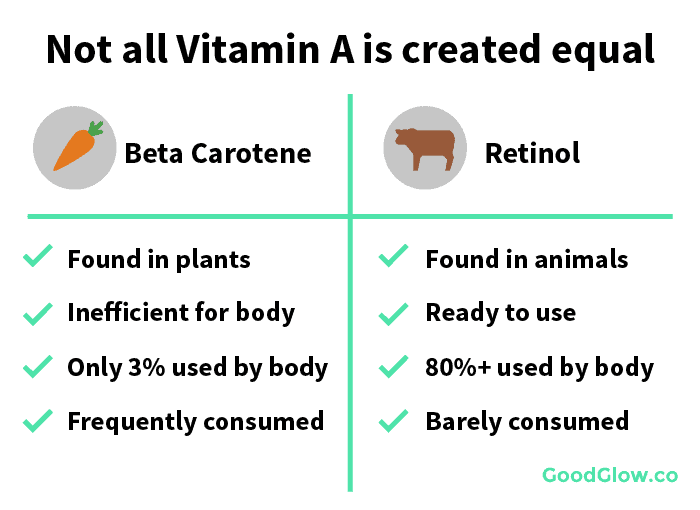
However, when you eat and cook vegetables with fat (like coconut oil), you give the nutrients in your vegetables a much better chance of actually being used by the body.
Some studies have found that consuming vegetables with fat can triple the amount of vitamin A you absorb.
The takeaway: cook or saute your vegetables in a healthy, anti-inflammatory fat.
Coconut oil can help with hormonal acne
If there’s one hormone that’s behind acne, it’s insulin.
Insulin is the hormone that your body releases to help muscles absorb carbohydrates from food. The process looks a little like this:
- You eat foods with carbs in them
- The carbs enter the body and are converted into glucose (carbs the body can use)
- Insulin is released to help your muscles absorb glucose
- When you work out or exercise, your body burns the carbs stored in muscles
- Eat, sleep, and repeat
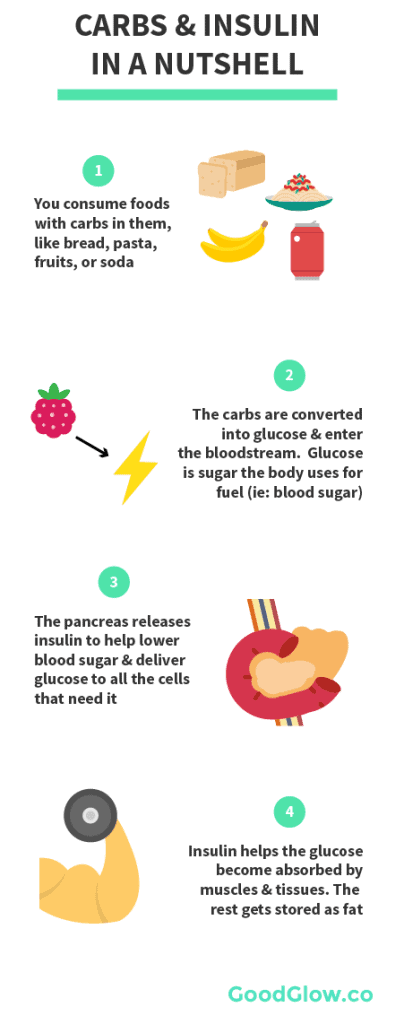
This process usually works great, except when you’re consuming too many carbs (like most Americans are) or not exercising enough. Your body eventually develops something called insulin resistance.
You eat so many carbs and burn such little glycogen that you end up needing more and more insulin just to move any blood sugar around. Pretty soon you have crazy high levels of insulin, which creates acne by clogging pores, triggering inflammation, producing too much skin oil, and telling the body to create way too many skin cells.
Upwards of half of all Americans are estimated to have insulin resistance.
It begs the question – what type of food triggers the most insulin?
Carbs-heavy foods like pasta, sweets, potatoes, and junk food.
What triggers the least? Fats like coconut oil, ghee butter, and olive oil.
Pure fats, like coconut oil, oftentimes don’t trigger an insulin response from the body, which is part of the reason why coconut oil is not considered to break a fast.
Part of the reason intermittent fasting is so useful for acne is that it decreases insulin resistance and keeps insulin low for most of the day.
PS: I wrote an entire guide to intermittent fasting for acne.
Instead of gulping down on orange juice and sugar-filled yogurt for breakfast every morning, consider Bulletproof Coffee or intermittent fasting. That way you won’t be on an insulin roller-coaster all day and spike acne-causing hormones.
Coconut oil is anti-inflammatory
Remember how we were talking about chronic inflammation earlier?
That nasty process that takes a harmless acne infection and turns it into a bright red pimple?
Coconut oil is an anti-inflammatory food, which means it fights inflammation.
One of the main factors that determine whether or not a food is inflammatory or anti-inflammatory is the ratio of omega-3 to omega-6 fatty acids:
- Omega-3 Fats are anti-inflammatory. More Omega-3s = Less Inflammation = Less Acne
- Omega-6 Fats are pro-inflammatory. More Omega-6s = More Inflammation = More acne
While coconut oil doesn’t have a ton of healthy omega-3 fatty acids found in fish and fish oil, it’s extremely low in unhealthy omega-6 fatty acids.
Coconut oil has just 0.23g of omega-6 fatty acids per tablespoon, which is lower than just about every fat out there:
- Coconut oil: 0.23g
- Olive oil: 1.32g
- Avocado oil: 1.71g
- Canola oil: 2.59g
- Soybean oil: 4.75g
- Sunflower oil: 8.95g
What does this mean for your skin? It means coconut oil is one of the safest foods to eat for acne-prone skin.
What kind of coconut oil is best for acne-prone skin?
So, you’re convinced that you need some more coconut oil in your life – great!
But hold on a second – before you go buy the biggest tub you can at the grocery store, keep in mind that not all coconut oil is created equal.
Whether you’re putting coconut oil on your skin or in your body, you’re going to want the highest-quality coconut oil you can find.
When it comes down to it, you’re looking for three things when it comes to coconut oil:
- Organic – going organic means you avoid any pesticides or chemicals from fertilizer that may aggravate acne or the gut
- Unrefined (virgin) – always look for virgin coconut oil. “Virgin” means that it’s free of additives and bleach, unlike refined coconut oil, which often undergoes a process to remove part of the smell or taste (embrace the coconut!)
- Cold-pressed – cold-pressed simply means that there was no excessive heat used to extract the oil from the coconut. Alternatively, expeller-pressed coconut oil does use heat and pressure, which can oxidize some of the fatty acids and strip its nutritional benefits
The good thing about coconuts and coconut oil is that it’s really easy to find high-quality organic products at a reasonable price.
I recommend Viva Naturals Organic Virgin Coconut Oil. It’s organic, it’s cold-pressed, and it’s virgin.

Best of all, it’s about the best deal you can get. A single tub will last me at least two months, and I eat coconut oil daily.
Now for the fun stuff – what can you use coconut oil for?
How and when to eat coconut oil for acne
Coconut oil is one of those things that I bet you’ll fall in love with after you start eating it.
It doesn’t have the highest smoke-point in the world (320° F), so I wouldn’t recommend it for extremely high-heat cooking (go with grass-fed ghee instead, it has a smoke point of 450° F).
Just because you can’t use it at extremely high temps doesn’t mean it doesn’t have a ton of use-cases:
- Saute your vegetables with a combination of coconut oil and olive oil
- Make “Bulletproof” coffee or tea in the morning – put a tablespoon or two of coconut oil in your morning beverage of choice for an insulin-friendly breakfast alternative!
- Put it in a smoothie (heat it before you throw it in there, otherwise, it’ll clump!)
- Cook meat or fry eggs in a combination of coconut oil and grass-fed ghee – trust me, this is the ultimate fat combination for meat
- Eat a spoonful before bed or after meals to feel more satiated and fight hunger
Once you go coconuts for coconut oil, there’s no going back.
Putting it all together
Coconut oil is all the rage lately.
Sometimes, it seems like the latest Instagram or Pinterest influencer claims that coconut oil can cure just about everything. From acne to eczema, digestive disorders to diabetes, coconut oil is truly a superfood.
With all that being said, should you really be putting coconut oil on your skin?
Maybe
Coconut oil:
- Has been shown to fight acne bacteria better than harsh over-the-counter acne cleansers
- Can moisturize and heal the skin
- Can reduce swelling and redness
Unfortunately, coconut oil is also very comedogenic, which means it can easily block pores and create more acne.
That’s why I ultimately recommend that people try coconut oil and see how it affects them individually – if it does make you break out, try a natural non-comedogenic moisturizer like aloe vera.
On the flip side, should you eat coconut oil for clear skin?
Absolutely
Coconut oil:
- Heals the gut
- Prevents hormonal acne (insulin)
- Fights inflammation
- Improves nutrient absorption
A tablespoon or more per day of high-quality, organic, cold-pressed and unrefined coconut oil can be a huge help in fighting acne and improving your overall health.
As always, remember – everyone is different, and coconut oil is going to affect everyone differently. Listen to your body, trust what it’s telling you, and stick with it!
Looking for more healthy fats and foods that fight acne? Check out the GoodGlow Diet Blueprint for a full list of the best and worst foods for acne.
